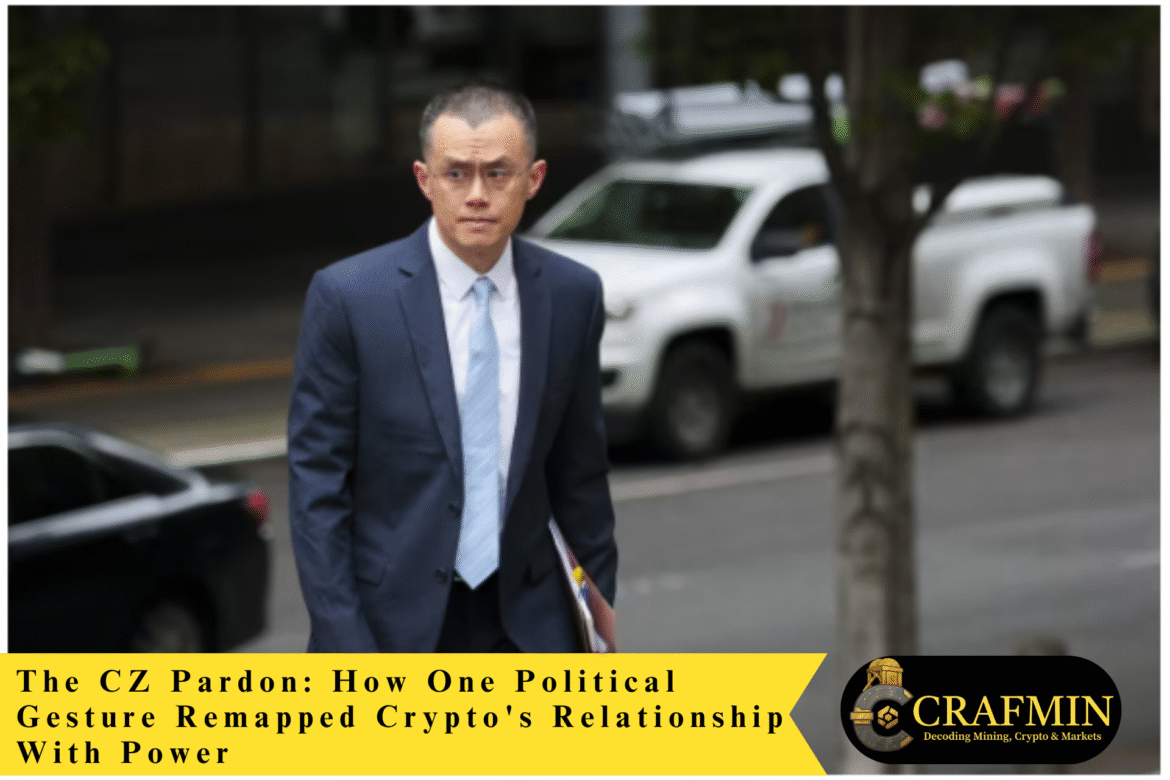US President Donald Trump gives a full pardon to Binance CEO Changpeng “CZ” Zhao, wiping away a 2023 felony conviction that sent CZ to jail and forced Binance to shell out fat settlements. It’s against the background of a reported change of heart in Washington towards crypto assets and sends markets, Capitol Hill and boardrooms across the globe reeling like an earthquake. A move that leaps across centuries of judicial doublespeak looming over CZ and Binance. That’s evidence that there’s greater political acceptance of crypto from a previous US government where enforcement was to be anti-innovation and that landmark throws the paradigm for how money and power now intersect with code and capital. (reuters)
 Trump’s CZ pardon signals Washington’s new embrace of crypto. (Image Source: MarketWatch)
Trump’s CZ pardon signals Washington’s new embrace of crypto. (Image Source: MarketWatch)
What Really Occurred Suddenly, It Appeared, In Reality
White House, Oct. 23, 2025, grants presidential pardon to Changpeng Zhao. The pardon erases Bank Secrecy Act offenses and the offenses which led to a multi-billion-dollar settlement and CZ’s arrest. The administration casts the clemency in rehabilitative terms an effort to close the book on the chapter which it regards as having been combative in crypto policy. The news triggers an automatic reaction: so-called Binance tokens value, industry giants assume more formal stance, and critics denounce administration for hiding political gain behind personal gain.
Why It Matters Now: The Real-World Implications
- First: legal mobility. Presidential legal flexibility erases collateral sanctions excepting the criminal from involvement in regulated finance. That would be less constraint for CZ if Binance opens U.S. markets, bank deposits, or regained dominance at regulated houses.
- Second: market confidence. The clemency is also being leveraged by investors as political asylum for a major crypto business. That confidence or at least the perception of it is what manifests in money flowing into not just Binance-branded funds but into pockets of the market that had previously been starved for fear of regulation.
- Third: regulatory dynamics. The pardon shifts the incentives of regulators and politicians. Hardest the rules people like have to effect change is flipping enforcement on its head is light touch the way people like feel it returns to balance after overreach. The net is single-sided playing field on crypto’s future subject to: markets and politicians, or agencies and courts.
How It Rewrites History Of Crypto And Power
Crypto was stateless money. Fact, but the marketplace never has been an issue of state control in bank rails and courtrooms and licenses. CZ’s pardon makes de facto that interdependence: the future of the technology can now hinge on the stroke of a single Oval Office pen. That irony necessitates new reality throughout the system. The politicians spin their story on its head in a moment. The defenders spin the amnesty as proof that open political process is a source of ingenuity. The critics as proof of a quid pro quo amnesty for sale at cash and buddies. Both, political theater now has greater ability to make crypto valuations and planning alter.
Wows Of The Day Politics, Markets And Outrage Of Morality
Two-party politicians respond. Open to some as a rebranding for a job-creating, tech-sweeping company. Others criticize it as billionaire crony capitalism for a failed experiment that could not keep illegal flows out. Rhetoric generates two phenomena: rapid takeup and simplicity in regulation. Champagne is offered on terms by markets and investors. Trading desks, exchanges, and venture-capital firms want to assume there will be a benign climate if Washington keeps the door open to innovation. But there is one condition to champagne: stability has to be earned through rules, not exception. Market players are aware that any single amnesty will never function well for regulatory purposes.
Future Compels The Market To Come
- Near term: Binance-crypto adjacent tokens to the moon. Returns on some pairs that provide liquidity. Institutional counterparties banks and custodians, and clearinghouses repricing risk models.
- Medium term: institutional counterparties custodians, banks, and clearinghouses repricing risk models. Pardon eliminates some legal hurdles but scant compliance necessity. Regulators need to have such confidence in them before institutions restart broad relationships afresh. That is, term sheets and negotiations, and not overnight reopenings.
- Long term: policy clarity vs clemency. Politicians who do the right, sound sense rules thing give markets a structural incentive. Where policy is replaced by politics, there is litigation and chaos. Follow-through does pay. (reuters)
 Binance’s rebound sparks a crypto surge and institutional rethink. (Image Source: Livebitcoinnews)
Binance’s rebound sparks a crypto surge and institutional rethink. (Image Source: Livebitcoinnews)
An Inside Story: Power, Persuasion And The Soft Art Of Influence
Behind the headlines is a weary waltz. Politicians are wooed by corporate chieftains, contribute to their campaigns, and provide strategic counsel. The CZ pardon is not reunification by statute; it’s the payoff of a few months or years of lobbying, appearances, and business statecraft. That’s not political wrong-doing, but an expose of the politics-making business model of crypto today: political melodrama. The lesson for startups and protocols is pragmatic: lobbying and reputation are as important as quality code. The ecosystem matures when it is able to woo developers and juice.
Regulation Vs. Reconciliation: What Wins?
- There are three options that are most likely to: Substitutes have reconciliation with. Pardon is détente stop: business wants greater guardrails against threat of open market entry. This path has strongest long-run effect.
- Politicised permissiveness. Pardon normalises preference-based outcomes business as usual, and companies are rewarded for access investments instead of conformance. This path is systemic risk and political risk focused.
- Hybrid tug-of-war. Scandal cycles and phases of adoption in the market. Agencies and Congress respond with punctuated reforms driving behavior incrementally.
- It happens either way depending on whether actors perceive the pardon as precedent or exception. The former requires processual reform; the latter requires cycles of influence.
What Australians Regulators, Exchanges And Business Need To Know
Australia is half-way between market and regulator. Onshore market trades are filtered for liquidity risk and compliance risk. ASIC and APRA, regulators in Australia, are sensitive to changes in U.S. policy because reverse flows of multinational flows happen at the nick of time. Multinationals with global custody structures are sensitive: U.S. policy change can trigger arbitrage in provision of services and compliance cost. The Australian spirit of entrepreneurship is roll up sleeves: obey, but with politics-eyegrass as well. Businesses that believe the web of regulation will not catch them out are left out in the cold when the political breeze starts blowing the other way. But businesses investing in governance are guaranteeing their survival when markets turn around.
https://x.com/bayanimills/status/1981854110803808338
A Brief Primer: The Legal Bottom Line
President Trump pardon of Changpeng “CZ” Zhao on October 23, 2025 erases from the federal criminal record more than Binance and its creator. The pardon erases CZ of the specific criminal incapacities balanced in the US for that offense but does not erase border-to-border inquiry or rule somewhere else. Briefly: pardon restores CZ to its right to participate in elections and enter into contracts conviction has so far denied it, but neither expunge evidence against the prosecution nor grant regulators a clean slate. Most have models calibrated appropriately; some windows slightly ajar, others firmly closed.
Three Likely Regulatory Conduits With Reasonable Timelines
I see three likely policy directions in the next 12–36 months. Three of them are market reforms, money destination, and compliance incentives.
- Institutional Reconciliation (12–18 Months) The “Cooperate With Regulators” Strategy
What happens: U.S. policymakers turn the pardon into a political do-over. Federal agencies and Congress act with improved, more open industry regulation that deters terrible compliance (i.e., licensing regimes, inter-op KYC standards, and open custodial business). Transparency and access to banks, audited custody market makers are given direct access to the real-time market. Market impact: orderly access by market makers to the market; structural volatility reduced; legacy crypto products see capital returning to them. This is the safest among the group and institutionals like it most openly. Industry comment and market report is this is what the industry likes.
Timeline: rule-making and legislative templates within 6–12 months; finished templates 12–24 months; institutional use across the board after 18 months. - Politicised Permissiveness (3–12 Months) The “Favours Then Flight” Track
The alternative: The pardon offers political interference cover in the guise of a plausible alternative to legal finality. Political relationship precedes compliance for certain firms, and regulators head towards softness and victimisation. Pressure from the market: pseudo-wild rides for politically-exposed business players; heightened headlining risk and spasmodic regulation to a scandal one after another. Short-term liquidity bubbles are different from long-term credibility. Yesterday’s Binance headlines regarding schemes U.S. return after pardon foretell the promise and the risk.
Timeline: days for short-term market reactions; mercurial enforcement and headlines in 3–12 months; policy whiplash if scandals erupt. - Reg Frag And Arbitrage (12–36 Months) The “Pick Your Jurisdiction” Solution
What’s happening: Reg fragmentation. U.S. is business-friendly, EU countries are stringent pro-consumer enforcers, and Asian jurisdictions strangle AML regimes. Companies choose most-harmonized jurisdictions for market access and compliance cost. Market effect: patchwork regulation; ecosystems would cluster around strong anchors; cross-border frictions are transferred to retail consumers’ bill. Foreign regulators already have solid domestic cases and ongoing civil cases on their plates, so political one-way pressure in Washington doesn’t rule out domestic cases.
Timeline: 12–36 months for restructuring multinational; longer time frame for international coordinated standards.
Who’s On The Move: Stakeholder Playbooks and Strategic Responses
Binance and CZ
Objective:
Regain control of operations, rebuild trust, and re-enter the U.S. market without provoking renewed probes.
Expected Response:
- Reform corporate governance.
- Hire additional compliance staff (including former regulators and senior bank compliance officials).
- Increase public disclosures.
- Form strategic partnerships with U.S. custodial or banking allies.
Public disclosures already indicate Binance’s intention to pursue U.S. re-entry following the pardon.
Risk:
Political backlash and congressional inquiries could undermine the gains as markets rally.
Other Players in the Industry (Coinbase, Kraken, FTX Old Guard Spin-Offs)
Target:
Position themselves as the “compliant” brand.
Expected Actions:
- Emphasize existing American licensing.
- Conduct follow-up third-party audits.
- Promote transparency and consistent regulation across markets.
These players stand to benefit from faster business growth if regulators impose stricter entry conditions.
Banks and Custodians
Objective:
Protect capital and reputation.
Likely Actions:
- Maintain relationships until final outcomes are clear.
- Keep the “forgiveness” option open to re-engage strategically—but only with solid proof of compliance.
Banks and custodians will review risk models but are unlikely to act independently.
Regulators and Lawmakers
Purpose:
Ensure consumer and market protection while managing political signaling.
Planned Actions:
- Launch parliamentary select committee reviews and scrutiny hearings.
- Investigate potential politicization of the pardon.
- Accelerate formal statutory definitions for digital assets to replace ad-hoc enforcement.
Congressional media already hints at bipartisan investigations into political pressure.
Australian Institutions (ASIC, APRA, Exchanges)
Purpose:
Safeguard retail consumers and uphold market integrity.
Possible Actions:
- Review domestic licensing and cross-border fund flows.
- Tighten foreign exchange and transparency requirements.
Recent Australian actions against Binance’s local office show regulators will continue enforcing accountability despite U.S. developments.
Domestic firms will watch closely to see whether U.S. events trigger capital or talent flows they can capitalise on.
Institutional Fund Managers and Sovereign Wealth Funds
Objective:
Invest prudently and generate returns from tokenized assets.
Anticipated Steps:
- Run pilot programs in controlled environments.
- Test custody and token-settlement systems within regulated frameworks.
- Exploit political stability where possible.
The pardon introduces new options for funds cautious about U.S. exposure, though sovereign wealth managers will maintain strict risk controls.
Regulatory And Legal Checklist To Keep In Mind For Firms Considering Re-Entry
If there is going to be a final cross-border transaction centered on the U.S., expect a complete shadow checklist from regulators and counterparties:
- Remediation and audit AML/KYC stand-alone account.
- Good governance: independent-regulatory-experience board members.
- Custody papers stand-alone and financial disclosure.
- Third-party custody contracts with insured custodians.
These are not courtesy calls — this is minimum baseline any serious institutional counterparty will provide. Legal brief and analysis boutiques already have a view that a pardon wipes away one hurdle but does not plug the gap with squeaky-clean compliance.
Key regulatory and legal steps for firms eyeing a U.S. re-entry. (Image Source: Tookitaki)
Political And Ethical Aftershocks The Democratic Risk
Blank amnesty harvests democratic disillusionment: it’s demonized as corrupting the powerful and weakening enforcement credibility; its champions redeem it as pragmatic pragmatism with zealot prosecution. Senators and Congressmen already are loudly calling for investigations, so judicial relief in the Oval Office just escapes political agendas. The scandal to follow will test whether succeeding governments continue crypto enforcement as technical administration or political spectacle.
Also Read: North Korea Cryptocurrency Hacking Hits $2.84 Billion In Global Thefts
Pragmatic Recommendations To Australian Policymakers And Firms (What To Do Now)
There are three pragmatic pieces of advice of paramount importance to Australian regulators, fintechs, and markets:
- Double down on consumer protections. ASIC’s recent action against Binance Australia indicates that consumer protection is not optional; firms will need to deliver sufficient client segmentation and risk disclosure.
- Regulatory hedge divergence management. Modular operations: autonomous jurisdictional units, pre-programmed compliance and common technical controls modules. Low regime liquidity flow cost.
- Invest in political literacy, politically. Take it on the road and talk to legislators levellobbying is fine if it funds policy solutions, not privilege.
https://youtu.be/KpAOU45VKT8?si=pQy0TD3e05rr68eb
Final Verdict What The CZ Pardon Substitutes, And What It Maintains
The pardon is both instrumental and symbolic. Symbolically, it is our political obligation to move forward and restore the crypto economy. Instrumentally, it removes one obstacle for one world-player. It does not release us from the necessity of compliance structure, nor substitutes the necessity of statute, rule and cross-border co-ordination. If serious, long-term regulation placing market participants into open-ended commitments, the amnesty is crypto institutionalizing power of a generation duration. If politicizing wagering as normal business, the industry is susceptible to boom-and-bust cycles then regulatory resistance boom-and-bust-cycle that the industry cannot even endure. To citizens of a consumer-poor and innovation-poor country, it is a simple message: hold corporate players to account, invest in modularity within the law and technology, and use spectacle in politics as information and not as strategy. Whether or not it will be done depends on Australia’s regulators and business leaders.
Frequently Asked Questions (FAQs)
- Q: Is the pardon liable to be overturned by other nations or the courts?
A: American courts cannot “overturn” American presidential pardons, which are limited to federal crime cases. They do not bind other sovereign states or civil tribunals; other governments aren’t bound to act on sanctions or enforcement in areas they have jurisdiction. - Q: CZ To Become Binance CEO Again?
A: Pardon is legally challengeable, business decision on board counsel, investor trust and regulator approval. All firms desire to see safe, clear control transition build stakeholder and regulator trust. Market reporting suggests Binance explores U.S. alternatives; that is not a near-term re-conquest of control choice. - Q: Is It Altering AML Terms For All Exchanges?
A: No. The absence of a single founder will not affect statutory AML requirements because AML laws and regulation form its bedrock. The firms have legal obligations to uphold BSA/AML practices and global standards. - Q: Australian Retail Investors Should Do What?
A: Accept the pardon in principle, not on advisory. Reassess risk strategy, eschew leverage in head-line risk situations and seek platforms with robust consumer protections and impeccable governance. Regulators will continue to be subject to local regulation; choose platforms on that basis. - Q: What Exactly Does The CZ Pardon Actually Eliminate?
A: The pardon erases federal convictions and the attendant immediate legal onus in America but not what occurred or possibly civil sanctions or exposure elsewhere. - Q: Binance Just Going To Reopen The US Market?
A: No. A pardon lowers a high compliance hurdle, but banks, custodians and regulators desire good compliance and governance assurances before they return. - Q: Does That Make The US Government Crypto-Friendly Now?
A: Clemency is political, but code and regulatory framework provide pro-crypto long-term policy. One clemency sends so much symbolically, yet can’t do for statutory certainty. - Q: Would This Affect Global Crypto Regulations?
A: Yes. US policy leads the way. Washington leads the way for other nations; pro-business tilt could shape regulatory debate elsewhere, i.e., Australia, Europe and Asia.
Q: Is The Pardon Controversial?
A: Yes. Excessive partiality undermining enforcement in the view of detractors, corrective justice to an undeservedly punished sector in the view of its defenders. The farce is conducted in dealing rooms, committees and courtrooms.

